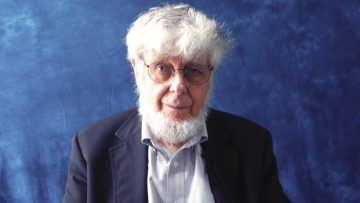Robert Pollack in Edge:
 How do we understand that our 100,000-fold excess of numbers on this planet, plus what we do to feed ourselves, makes us a tumor on the body of the planet? I don’t want the future that involves some end to us, which is a kind of surgery of the planet. That’s not anybody’s wish. How do we revert ourselves to normal while we can? How do we re-enter the world of natural selection, not by punishing each other, but by volunteering to take success as meaning success and survival of the future, not success in stuff now? How do we do that? We don’t have a language for that.
How do we understand that our 100,000-fold excess of numbers on this planet, plus what we do to feed ourselves, makes us a tumor on the body of the planet? I don’t want the future that involves some end to us, which is a kind of surgery of the planet. That’s not anybody’s wish. How do we revert ourselves to normal while we can? How do we re-enter the world of natural selection, not by punishing each other, but by volunteering to take success as meaning success and survival of the future, not success in stuff now? How do we do that? We don’t have a language for that.
(ROBERT POLLACK is a professor of biological sciences, and also serves as director of the University Seminars at Columbia University.)
I’m asking myself what’s most important to do in the time I have. I’m very grateful for the time I have. I’m astounded at the difference between where I am and where I was in my memory, and astounded at the absence of a future stability to meet the stability that I had when I was growing up.
I was born in 1940. I’ve lived through the period of the greatest hegemony of American power and democracy and military might, with you and everybody else my age. We’ve lived seventy years without a nuclear war, after the use of nuclear weapons once. I look at my students who have remained the same age for the forty years I’ve been teaching them as I’ve gotten forty years older, and I wonder what their lives will be when they’re my age, what their grandchildren’s lives will be. That’s what’s on my mind. I don’t think it’s a political question at all. It’s an existential question. It may be a religious question. It is certainly an emotionally driven question. I’m a scientist, so I guess I have to say as well that it’s a scientific question. When I think about it as a scientific question, I think about it in terms of my work.
More here.
